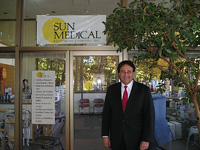DETROIT, Mich. - AmeriCare turns 25 this year and when company execs peer into the future, they see two obvious opportunities. First, a growing business with unions and other self-insured organizations. Second, an increasing demand by medical specialists for its one-stop-shop offering.
"There was a time, 10 or 12 years ago, when only 6% to 7% of Fortune 500 companies were self-funded, now it is 35% to 40%," said Senior Vice President Greg Boyajian. "In Michigan and other industrial states we are seeing opportunities."
The driving force: organizations trying to control skyrocketing healthcare costs by eliminating the middleman.
AmeriCare now generates about 20% of its annual $6 million in revenue from business with self-insured organizations. The company, which plans to open its fourth location this fall, operates AmeriStaff Nursing Services, Sun Medical Equipment Co. and Rx iV Pharmacy.
The "beauty" of self-insured companies is that they closely track line-item expenditures. Large private insurers like BCBC may track how much they spend on HME services annually, but they very often do not break those expenditures down into specific product categories, Boyajian said. "You can identify those (line items) and say to a source, 'You paid that this year, but if you do business with us on an annual basis, I'm going to save you this much,'" he said.
By examining the utilization data provided by self-insured organizations, AmeriCare can often contract to reduce those expenditures by 8% to 10%. The company makes up much of that discount by buying in bulk, which provides access to manufacturer volume discounts.
"It works great if you can pull it off, but it requires careful buying," Boyajian said.
AmeriCare started as an HME in 1980 -- Sun Medical is still its flagship company -- and over time added infusion and staffing.
While many companies have shunned the one-stop-shop approach in favor of specializing in respiratory, rehab or some other niche, AmeriCare has embraced it. The payoff: a growing business with oncologists, pulmonologists, cardiologists and other specialists who want to deal with one homecare company, not two or three or four, Boyajian said.
What's more, as medical science develops new breakthroughs, and multi-need patients become more open to being treated in the home, the one-stop-shop should gain popularity, Boyajian said.
"Bundled services are not as tough to swallow at home as are splintered services," he said. "You get two, three or four companies marching into their house and it's a terrible situation. Families are much more comfortable when they find out one company is accountable, and we market that."




Comments